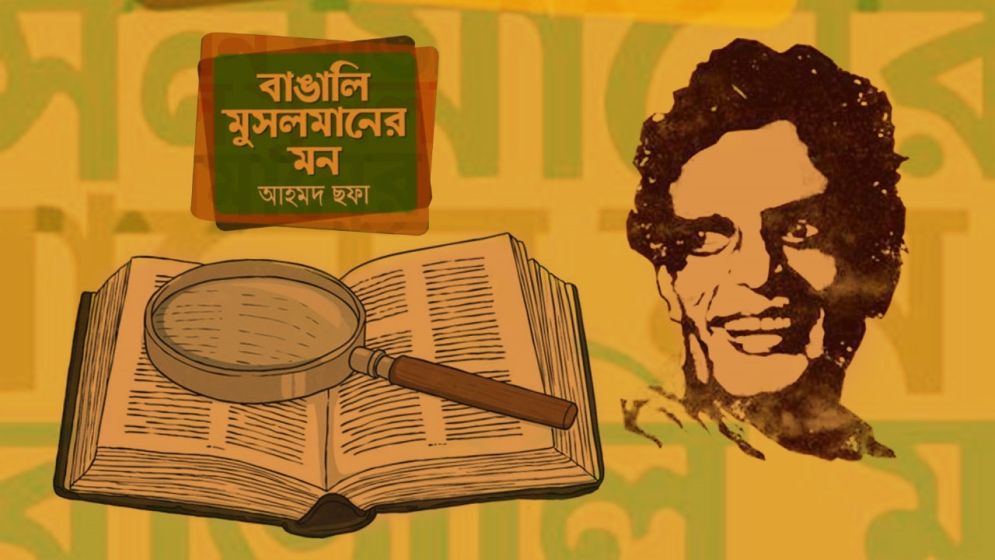Ahmed Sofa’s unquiet intellect and its timeless significance

Ahmed Sofa’s essay on “The Mind of the Bengali Muslim” was always destined to be riddled with hesitation and contradiction. How could it be otherwise?
He never escaped the intellectual echo chamber in which he was formed. Had he spent time immersed in the rigor of Western academia–or even in prolonged dialogue with global thinkers–the outcome might have been sharper, more objective, less bound by provincial limits.
The highest intellectual influence in his life was Professor Abdur Razzaq, the “Diogenes of Bengal.” Razzaq shaped him profoundly, more than any other mentor.
Yet Razzaq himself–brilliant though he was–was hardly operating on the intellectual terrain of a Harold Laski, a Sartre, a Chomsky, or an Edward Said.
Sofa’s other associations, however talented, did not alter that fact. He never encountered the discipline of Oxford, Harvard, or Cambridge; he never sparred with the intellectual heavyweights of his time.
This matters. Because when a Bengali Muslim thinker apprentices himself to another Bengali Muslim thinker, the circle can be tight, the limits preordained.
Sofa’s essay bears the weight of that limitation. It is marked less by the rigor of structured research than by instinct, assumptions, and the burden of inherited conflicts.
To be clear, his work is not without value. It contains flashes of truth, and even brilliance. But truth laced with presupposition is not the same as objective scholarship.
One is reminded, reading Sofa, of what might have been–had he chosen, or been given, the chance to test his ideas against stricter methods and broader horizons.
Ahmed Sofa was, above all, a self-made intellectual. He built his mind through raw intelligence, voracious reading, and a lived sense of history rather than the stamp of elite institutions.

Sofa’s unique brilliance
His analytical power came less from the classroom than from the street, the library, and the unforgiving realities of his time. Yes, this inevitably left gaps–his scholarship lacked the polish of Oxford or Harvard–but to dismiss him on that basis is to misunderstand where his strength lay.
The wisdom forged by life, after all, often cuts deeper than the wisdom embalmed in books. And on that front, Sofa surpassed a legion of careerist academics whose degrees outshone their insight.
Sofa’s originality lay in the unlikely combination of innate brilliance, the influence of Abdur Razzaq, his self-directed engagement with Western thought, and, crucially, his refusal to separate knowledge from experience.
Many of Bangladesh’s credentialed intellectuals have mastered none of these. Sofa did.
But perhaps his most defining quality was moral courage. Without it, intellect collapses into servitude, an ornament to the system it should interrogate.
Sofa lived through the age of Pakistan, the birth of Bangladesh, and the disillusionment of its independence. He saw the rot–corruption, betrayal, institutional decay–long before most dared to name it.
Unlike the intellectual class around him, forever content to play the “twelfth man” in the nation’s great game, Sofa refused to sit on the sidelines. He wielded his intellect as resistance, his pen as protest.
For that, his contribution is best understood as a kind of poor man’s Chomsky–a voice unarmed with the credentials of the great universities, yet armed with conviction, clarity, and the rare courage to speak against power.
In a society where too many thinkers barter silence for comfort, that was no small feat.

Seeing through the veils
It would be a mistake to grant Ahmed Sofa a prophetic status. He was no oracle, and those who insist on placing him above criticism risk turning him into exactly what he resisted: a one-dimensional figure flattened by hagiography.
Sofa was central to Bangladesh’s intellectual life, but he was never the final word. Nor, for that matter, are his contemporaries–Badruddin Umar, Farhad Mazhar, Salimullah Khan, or Ibne Golam Samad.
Sofa himself once remarked that among Kazi Nazrul Islam’s many talents, only his music reached its fullest expression.
The irony is that the same judgment applies to Sofa. He launched into many roles–novelist, poet, critic, essayist–but rarely carried them to completion.
His most enduring contributions are his intellectual essays, where his sharpest insights emerged: on the structure of the state, the failures of society, the peculiarities of geopolitics, and the evolving terrain of art and literature.
These essays introduced ideas that reshaped how many Bangladeshis think about themselves.
But to truly learn from Sofa requires resisting our national tendency toward hero-worship. We are too quick to deify our writers and thinkers, to build them into legends instead of engaging with their ideas on their own terms.
Sofa’s work should be read not as gospel, but as provocation–a set of sparks meant to ignite further thought.
His words make the most sense when we place them in the context of his time, his circumstances, and the imperfect evolution of Bangladesh itself.
The principle here is not limited to Sofa. Intellectual maturity demands that no scholar, however revered, be treated as infallible.
To accept the useful and reject the flawed–that is the only way to keep knowledge alive. Sofa belongs in that tradition: neither prophet nor saint, but a restless thinker whose work rewards those willing to read him with both admiration and doubt.
—
Arefin Al Imran is a music director, producer and sound designer

